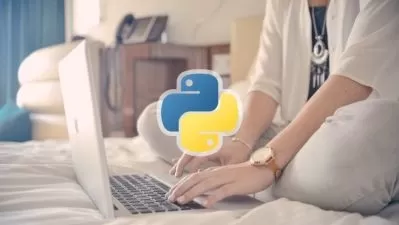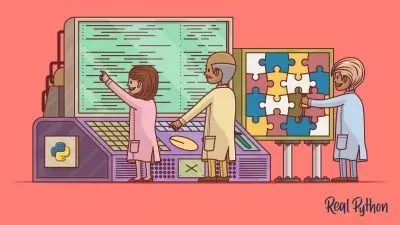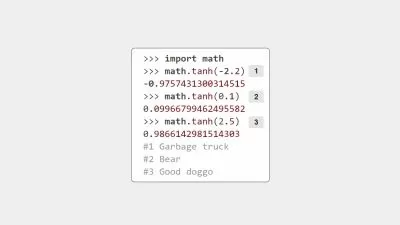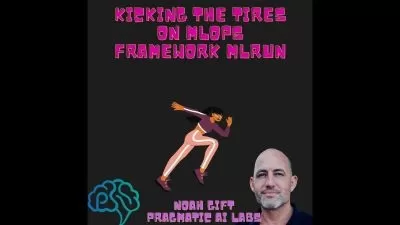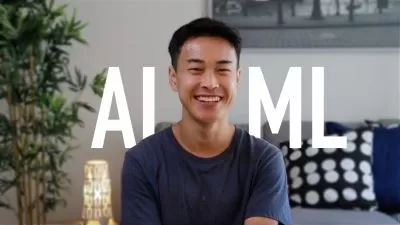Machine Learning with Python: A Mathematical Perspective
Dr Amol Prakash Bhagat
21:18:15
Description
Classification, Clustering, Regression Analysis
What You'll Learn?
- Concepts, techniques and building blocks of machine learning
- Mathematics for modeling and evaluation
- Various algorithms of classification and regression for supervised machine learning
- Various algorithms of clustering for unsupervised machine learning
- Concepts of Reinforcement Learning
Who is this for?
What You Need to Know?
More details
DescriptionMachine Learning: The three different types of machine learning, Introduction to the basic terminology and notations, A roadmap for building machine learning systems, Using Python for machine learning
Training Simple Machine Learning Algorithms for Classification, Artificial neurons – a brief glimpse into the early history of machine learning, Implementing a perception learning algorithm in Python, Adaptive linear neurons and the convergence of learning
A Tour of Machine Learning Classifiers Using scikit-learn, Choosing a classification algorithm, First steps with scikit-learn – training a perceptron, Modeling class probabilities via logistic regression, Maximum margin classification with support vector machines, Solving nonlinear problems using a kernel SVM, Decision tree learning, K-nearest neighbors – a lazy learning algorithm.
Data Preprocessing, Hyperparameter Tuning: Building Good Training Sets, Dealing with missing data, Handling categorical data, Partitioning a dataset into separate training and test sets, Bringing features onto the same scale, Selecting meaningful features, Assessing feature importance with random forests, Compressing Data via Dimensionality Reduction, Unsupervised dimensionality reduction via principal component analysis, Supervised data compression via linear discriminant analysis, Using kernel principal component analysis for nonlinear mappings, Learning Best Practices for Model Evaluation and Hyperparameter Tuning, Streamlining workflows with pipelines, Using k-fold cross-validation to assess model performance.
Regression Analysis: Predicting Continuous Target Variables, Introducing linear regression, Exploring the Housing dataset, Implementing an ordinary least squares linear regression model, Fitting a robust regression model using RANSAC, Evaluating the performance of linear regression models, Using regularized methods for regression, Turning a linear regression model into a curve – polynomial regression
Dealing with nonlinear relationships using random forests, Working with Unlabeled Data – Clustering Analysis, Grouping objects by similarity using k-means, Organizing clusters as a hierarchical tree, Locating regions of high density via DBSCAN
Multilayer Artificial Neural Network and Deep Learning: Modeling complex functions with artificial neural networks, Classifying handwritten digits, Training an artificial neural network, About the convergence in neural networks, A few last words about the neural network implementation, Parallelizing Neural Network Training with Tensor Flow, Tensor Flow and training performance
Who this course is for:
- Beginner Python developers curious about machine learning and mathematical modeling
Machine Learning: The three different types of machine learning, Introduction to the basic terminology and notations, A roadmap for building machine learning systems, Using Python for machine learning
Training Simple Machine Learning Algorithms for Classification, Artificial neurons – a brief glimpse into the early history of machine learning, Implementing a perception learning algorithm in Python, Adaptive linear neurons and the convergence of learning
A Tour of Machine Learning Classifiers Using scikit-learn, Choosing a classification algorithm, First steps with scikit-learn – training a perceptron, Modeling class probabilities via logistic regression, Maximum margin classification with support vector machines, Solving nonlinear problems using a kernel SVM, Decision tree learning, K-nearest neighbors – a lazy learning algorithm.
Data Preprocessing, Hyperparameter Tuning: Building Good Training Sets, Dealing with missing data, Handling categorical data, Partitioning a dataset into separate training and test sets, Bringing features onto the same scale, Selecting meaningful features, Assessing feature importance with random forests, Compressing Data via Dimensionality Reduction, Unsupervised dimensionality reduction via principal component analysis, Supervised data compression via linear discriminant analysis, Using kernel principal component analysis for nonlinear mappings, Learning Best Practices for Model Evaluation and Hyperparameter Tuning, Streamlining workflows with pipelines, Using k-fold cross-validation to assess model performance.
Regression Analysis: Predicting Continuous Target Variables, Introducing linear regression, Exploring the Housing dataset, Implementing an ordinary least squares linear regression model, Fitting a robust regression model using RANSAC, Evaluating the performance of linear regression models, Using regularized methods for regression, Turning a linear regression model into a curve – polynomial regression
Dealing with nonlinear relationships using random forests, Working with Unlabeled Data – Clustering Analysis, Grouping objects by similarity using k-means, Organizing clusters as a hierarchical tree, Locating regions of high density via DBSCAN
Multilayer Artificial Neural Network and Deep Learning: Modeling complex functions with artificial neural networks, Classifying handwritten digits, Training an artificial neural network, About the convergence in neural networks, A few last words about the neural network implementation, Parallelizing Neural Network Training with Tensor Flow, Tensor Flow and training performance
Who this course is for:
- Beginner Python developers curious about machine learning and mathematical modeling
User Reviews
Rating
Dr Amol Prakash Bhagat
Instructor's Courses
Udemy
View courses Udemy- language english
- Training sessions 37
- duration 21:18:15
- Release Date 2023/12/28






